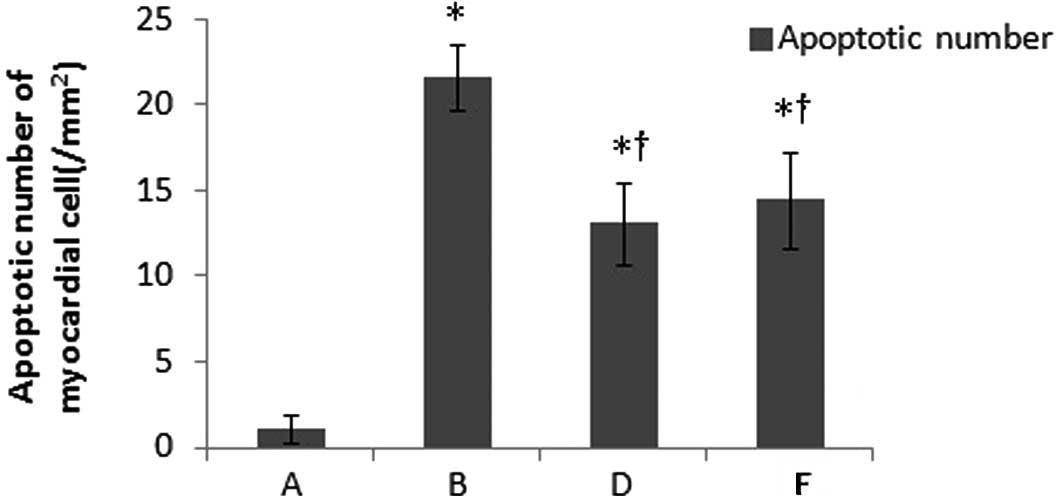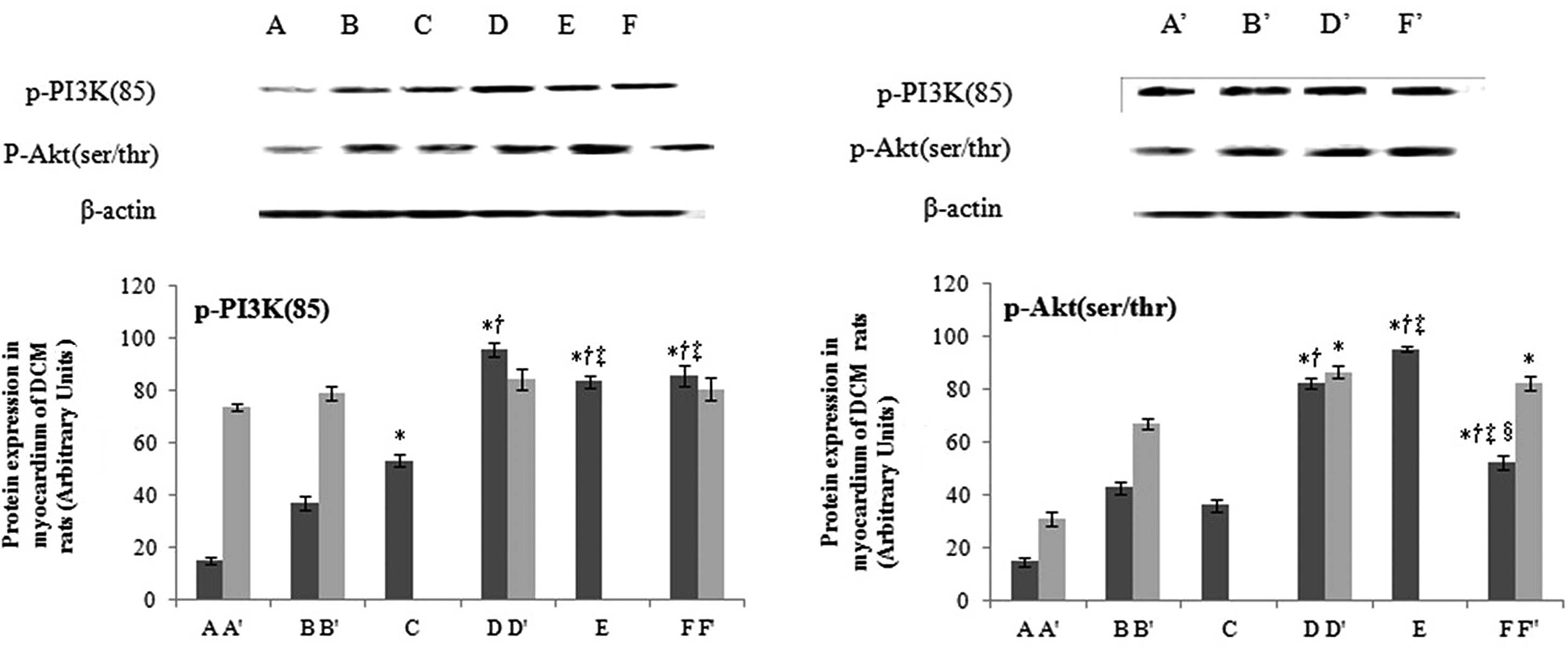|
1.
|
Fonarow GC and Srikanthan P: Diabetic
cardiomyopathy. Endocrinol Metab Clin North Am. 35:575–599. 2006.
View Article : Google Scholar : PubMed/NCBI
|
|
2.
|
Diskin CJ, Stokes TJ, Dansby LM, Radcliff
L and Carter TB: Beyond anemia: the clinical impact of the
physiologic effects of erythropoietin. Semin Dial. 21:447–454.
2008. View Article : Google Scholar : PubMed/NCBI
|
|
3.
|
Brines M, Grasso G, Fiordaliso F, et al:
Erythropoietin mediates tissue protection through an erythropoietin
and common beta-subunit heteroreceptor. Proc Natl Acad Sci USA.
101:14907–14912. 2004. View Article : Google Scholar : PubMed/NCBI
|
|
4.
|
Moon C, Krawczyk M, Paik D, et al:
Erythropoietin, modified to not stimulate red blood cell
production, retains its cardioprotective properties. J Pharmacol
Exp Ther. 316:999–1005. 2006. View Article : Google Scholar : PubMed/NCBI
|
|
5.
|
Coleman TR, Westenfelder C, Tögel FE, et
al: Cytoprotective doses of erythropoietin or carbamylated
erythropoietin have markedly different procoagulant and vasoactive
activities. Proc Natl Acad Sci USA. 103:5965–5970. 2006. View Article : Google Scholar : PubMed/NCBI
|
|
6.
|
Park KD, Mun KC, Chang EJ, Park SB and Kim
HC: Inhibition of erythropoietin activity by cyanate. Scand J Urol
Nephrol. 38:69–72. 2004. View Article : Google Scholar : PubMed/NCBI
|
|
7.
|
Leist M, Ghezzi P, Grasso G, et al:
Derivatives of erythropoietin that are tissue protective but not
erythropoietic. Science. 305:239–242. 2004.PubMed/NCBI
|
|
8.
|
Adembri C, Massagrande A, Tani A, et al:
Carbamylated erythropoietin is neuroprotective in an experimental
model of traumatic brain injury. Crit Care Med. 36:975–978. 2008.
View Article : Google Scholar : PubMed/NCBI
|
|
9.
|
Bianchi R, Brines M, Lauria G, et al:
Protective effect of erythropoietin and its carbamylated derivative
in experimental Cisplatin peripheral neurotoxicity. Clin Cancer
Res. 12:2607–2612. 2006. View Article : Google Scholar : PubMed/NCBI
|
|
10.
|
Fiordaliso F, Chimenti S, Staszewsky L, et
al: A nonerythropoietic derivative of erythropoietin protects the
myocardium from ischemia-reperfusion injury. Proc Natl Acad Sci
USA. 102:2046–2051. 2005. View Article : Google Scholar : PubMed/NCBI
|
|
11.
|
Imamura R, Okumi M, Isaka Y, et al:
Carbamylated erythropoietin improves angiogenesis and protects the
kidneys from ischemia-reperfusion injury. Cell Transplant.
17:135–141. 2008. View Article : Google Scholar : PubMed/NCBI
|
|
12.
|
Fantacci M, Bianciardi P, Caretti A, et
al: Carbamylated erythropoietin ameliorates the metabolic stress
induced in vivo by severe chronic hypoxia. Proc Natl Acad Sci USA.
103:17531–17536. 2006. View Article : Google Scholar : PubMed/NCBI
|
|
13.
|
Xu X, Cao Z, Cao B, et al: Carbamylated
erythropoietin protects the myocardium from acute
ischemia/reperfusion injury through a PI3K/Akt-dependent mechanism.
Surgery. 146:506–514. 2009. View Article : Google Scholar : PubMed/NCBI
|
|
14.
|
King VR, Averill SA, Hewazy D, Priestley
JV, Torup L and Michael-Titus AT: Erythropoietin and carbamylated
erythropoietin are neuroprotective following spinal cord
hemisection in the rat. Eur J Neurosci. 26:90–100. 2007. View Article : Google Scholar : PubMed/NCBI
|
|
15.
|
Xiong Y, Mahmood A, Zhang Y, et al:
Effects of posttraumatic carbamylated erythropoietin therapy on
reducing lesion volume and hippocampal cell loss, enhancing
angiogenesis and neuro-genesis, and improving functional outcome in
rats following traumatic brain injury. J Neurosurg. 114:549–559.
2011.
|
|
16.
|
Moon C, Krawczyk M, Lakatta EG and Talan
MI: Therapeutic effectiveness of a single vs multiple doses of
erythropoietin after experimental myocardial infarction in rats.
Cardiovasc Drugs Ther. 20:245–251. 2006. View Article : Google Scholar : PubMed/NCBI
|
|
17.
|
Robey TE, Saiget MK, Reinecke H and Murry
CE: Systems approaches to preventing transplanted cell death in
cardiac repair. J Mol Cell Cardiol. 45:567–581. 2008. View Article : Google Scholar : PubMed/NCBI
|
|
18.
|
Xu K, George I, Klotz S, et al:
Erythropoietin derivate improves left ventricular systolic
performance and attenuates left ventricular remodeling in rats with
myocardial infarct-induced heart failure. J Cardiovasc Pharmacol.
56:506–512. 2010. View Article : Google Scholar : PubMed/NCBI
|
|
19.
|
Abe T, Isaka Y, Imamura R, et al:
Carbamylated erythropoietin ameliorates cyclosporine nephropathy
without stimulating erythropoiesis. Cell Transplant. 21:571–580.
2012. View Article : Google Scholar
|
|
20.
|
Imamura R, Isaka Y, Sandoval RM, et al: A
nonerythropoietic derivative of erythropoietin inhibits
tubulointerstitial fibrosis in remnant kidney. Clin Exp Nephrol.
16:852–862. 2012. View Article : Google Scholar : PubMed/NCBI
|
|
21.
|
Schmidt RE, Green KG, Feng D, et al:
Erythropoietin and its carbamylated derivative prevent the
development of experimental diabetic autonomic neuropathy in
STZ-induced diabetic NOD-SCID mice. Exp Neurol. 209:161–170. 2008.
View Article : Google Scholar : PubMed/NCBI
|
|
22.
|
Cai L, Wang Y, Zhou G, Chen T, Song Y, Li
X and Kang YJ: Attenuation by metallothionein of early cardiac cell
death via suppression of mitochondrial oxidative stress results in
a prevention of diabetic cardiomyopathy. J Am Coll Cardiol.
48:1688–1697. 2006. View Article : Google Scholar : PubMed/NCBI
|
|
23.
|
Chen J, Cha-Molstad H, Szabo A and Shalev
A: Diabetes induces and calcium channel blockers prevent cardiac
expression of proapoptotic thioredoxin-interacting protein. Am J
Physiol Endocrinol Metab. 296:E1133–E1139. 2009. View Article : Google Scholar
|
|
24.
|
Li JH, Zhang N and Wang JA: Improved
anti-apoptotic and anti-remodeling potency of bone marrow
mesenchymal stem cells by anoxic pre-conditioning in diabetic
cardiomyopathy. J Endocrinol Invest. 31:103–110. 2008. View Article : Google Scholar : PubMed/NCBI
|
|
25.
|
Liu HR, Tao L, Gao E, et al: Rosiglitazone
inhibits hypercholesterolaemia-induced myeloperoxidase upregulation
- a novel mechanism for the cardioprotective effects of PPAR
agonists. Cardiovasc Res. 81:344–352. 2009.
|
|
26.
|
Bäcklund T, Palojoki E, Saraste A, et al:
Sustained cardiomyocyte apoptosis and left ventricular remodelling
after myocardial infarction in experimental diabetes. Diabetologia.
47:325–330. 2004.PubMed/NCBI
|
|
27.
|
Chowdhry MF, Vohra HA and Galiñanes M:
Diabetes increases apoptosis and necrosis in both ischemic and
nonischemic human myocardium: role of caspases and poly-adenosine
diphosphate-ribose polymerase. J Thorac Cardiovasc Surg.
134:124–131.e3. 2007. View Article : Google Scholar
|
|
28.
|
Xu J, Wang G, Wang Y, Liu Q, Xu W, Tan Y
and Cai L: Diabetes- and angiotensin II-induced cardiac endoplasmic
reticulum stress and cell death: metallothionein protection. J Cell
Mol Med. 13:1499–1512. 2009. View Article : Google Scholar : PubMed/NCBI
|
|
29.
|
Carrington EM, McKenzie MD, Jansen E, et
al: Islet beta-cells deficient in Bcl-xL develop but are abnormally
sensitive to apoptotic stimuli. Diabetes. 58:2316–2323. 2009.
View Article : Google Scholar : PubMed/NCBI
|
|
30.
|
Morrissy S, Xu B, Aguilar D, Zhang J and
Chen QM: Inhibition of apoptosis by progesterone in cardiomyocytes.
Aging Cell. 9:799–809. 2010. View Article : Google Scholar : PubMed/NCBI
|
|
31.
|
Matsui T and Davidoff AJ: Assessment of
PI-3 kinase and Akt in ischemic heart diseases in diabetes. Methods
Mol Med. 139:329–338. 2007. View Article : Google Scholar : PubMed/NCBI
|
|
32.
|
Williams DL, Ozment-Skelton T and Li C:
Modulation of the phosphoinositide 3-kinase signaling pathway
alters host response to sepsis, inflammation, and
ischemia/reperfusion injury. Shock. 25:432–439. 2006. View Article : Google Scholar : PubMed/NCBI
|
|
33.
|
Dhanasekaran A, Gruenloh SK, Buonaccorsi
JN, et al: Multiple antiapoptotic targets of the PI3K/Akt survival
pathway are activated by epoxyeicosatrienoic acids to protect
cardiomyocytes from hypoxia/anoxia. Am J Physiol Heart Circ
Physiol. 294:H724–H735. 2008. View Article : Google Scholar : PubMed/NCBI
|
|
34.
|
Amaravadi R and Thompson CB: The survival
kinases Akt and Pim as potential pharmacological targets. J Clin
Invest. 115:2618–2624. 2005. View
Article : Google Scholar : PubMed/NCBI
|
|
35.
|
Westermann D, Van Linthout S, Dhayat S, et
al: Cardioprotective and anti-inflammatory effects of interleukin
converting enzyme inhibition in experimental diabetic
cardiomyopathy. Diabetes. 56:1834–1841. 2007. View Article : Google Scholar
|
|
36.
|
Bilim O, Takeishi Y, Kitahara T, et al:
Diacylglycerol kinase zeta inhibits myocardial atrophy and restores
cardiac dysfunction in streptozotocin-induced diabetes mellitus.
Cardiovasc Diabetol. 7:22008. View Article : Google Scholar : PubMed/NCBI
|



















